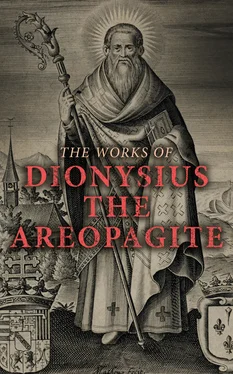SECTION VI.
The theologians, having knowledge of this, celebrate It, both without Name and from every Name. Without name, as when they say that the Godhead Itself, in one of those mystical apparitions of the symbolical Divine manifestation, rebuked him who said, “What is thy name?” and as leading him away from all knowledge of the Divine Name, said this, “and why dost thou ask my Name? “and this (Name) “is wonderful,” And is not this in reality the wonderful Name, that which is above every Name—the Nameless—that fixed above every name which is named, whether in this age or in that which is to come? Also, as “many named,” as when they again introduce It as saying, “I am He, Who is—the Life—the Light—the God—the Truth.” And when the wise of God themselves celebrate Him, as Author of all things, under many Names, from all created things—as Good—as Beautiful—as Wise—as Beloved—as God of gods—as Lord of lords—as Holy of Holies—as Eternal—as Being—as Author of Ages—as Provider of Life—as Wisdom—as Mind—as Word—as Knowing—as preeminently possessing all the treasures of all knowledge—as Power—as Powerful—as King of kings—as Ancient of days—as never growing old—and Unchangeable—as Preservation—as Righteousness—as Sanctification — as Redemption—as surpassing all things in greatness—and as in a gentle breeze.—Yea, they also say that He is in minds, and in souls, and in bodies, and in heaven and in earth, and at once, the same in the same—in the world—around the world—above the world—supercelestial, superessential, sun, star—fire—water—spirit—dew—cloud—self-hewn stone and rock—all things existing—and not one of things existing.
SECTION VII.
Thus, then, the “Nameless “befits the cause of all, which is also above all, as do all the names of things existing, in order that there may be strictly a kingly rule over the whole; and that all things may be around It and dependent upon It, as cause, as beginning, as end. And Itself, according to the Divine saying, may be the “all in all,” and truly sung as of all, producing, directing and perfecting and sustaining guard, and shrine, and turning towards Itself, and that uniformly, irresistibly and pre-eminently. For It is not only cause of sustenance, or life, or perfection,—so that from this or that forethought alone the Goodness above Name should be named, but It previously embraced in Itself all things existing, absolutely and without limit, by the complete benefactions of His one and all-creating forethought, and by all created things in joint accord It is celebrated and named.
SECTION VIII.
Further also, the Theologians do not honour alone the Names of God which are given from universal or particular Providences, or objects of His forethought; but also from certain occasional Divine Visions, in the sacred temples or elsewhere, which enlightened the initiated or the Prophets, they name the surpassing bright Goodness which is above Name, after one or other causes and powers, and clothe It in forms and shapes of man, or fire, or electron, and celebrate Its eyes and ears, and locks of hair, and countenance, and hands, and back, and wings, and arms, and hinder parts and feet. Also they assign to It crowns 16and seats, and drinking vessels and bowls, and certain other things mystical, concerning which, in our Symbolic Theology, we will speak as best we can. But now, collecting from the Oracles so much as serves the purpose of our present treatise, and using the things aforesaid, as a kind of Canon, and keeping our eyes upon them, let us advance to the unfolding of the Names of God, which fall within the range of our understanding, and, what the hierarchical rule always teaches us throughout every phase of theology, let us become initiated (to speak authoritatively) in the godlike contemplations with a god-enlightened conception. And let us bring religious ears to the unfoldings of the Holy Names of God, implanting the Holy in the Holy, according to the Divine tradition, and removing it from the laughter and jeers of the uninitiated; yea, rather, if certain men really are such, purifying them from their fighting against God in this matter. Be it thine, then, to guard these things, O excellent Timothy, according to the most holy leading, and to make the things Divine neither spoken nor known to the uninitiated. For myself, may Almighty God give me to celebrate, in a manner worthy of God, the numerous beneficent Names of the uncalled and unnamed Deity; and may He not take away a word of truth from my mouth.
12Cap. 3. Mystic Theology.
13Ib. c. I. s. 3.
14alogia.
15ἀνοησία.
16Letter to Titus.
Table of Contents
Concerning common and distinctive theology, and what is the Divine Union and distinction.
SECTION I.
Let then the self-existent Goodness be sung from the Oracles as defining and manifesting the whole supremely-Divine-Subsistence in its essential nature. For, what else is there to learn from the sacred theology, when it affirms that the Godhead Itself, leading the way, says, “Why dost thou ask me concerning the Good?—None is Good except God alone.” Now, this, we have thoroughly demonstrated elsewhere, that always, all the God-becoming Names of God, are celebrated by the Oracles, not partitively, but as applied to the whole and entire and complete and full Godhead, and that all of them are referred impartitively, absolutely, unreservedly, entirely, to all the Entirety of the entirely complete and every Deity. And verily as we have mentioned in the Theological Outlines, if any one should say that this is not spoken concerning the whole Deity, he blasphemes, and dares, without right, to cleave asunder the super-unified Unity.
We must affirm, then, that this is to be received respecting the whole Deity. For even the essentially Good Word Himself said, “I am Good 17.” And a certain one of the God-rapt Prophets celebrates the Spirit as “the Good 18.” And again this, “I am He, Who is 19.” If they shall say that this is said, not of the whole Deity, but should violently limit it to one part, how will they understand this? “These things, saith He, Who is, Who was, Who is to come, the Almighty 20,” and “Thou art the same 21,” and this, “Spirit of truth, which is, which proceedeth from the Father 22.” And if they say that the supremely Divine Life is not coextensive with the whole, how is the sacred Word true which said, “As the Father raiseth the dead and maketh alive, so also the Son maketh alive whom He will 23,” and that “the Spirit is He, Who maketh alive 24?” But, that the whole Deity holds the Lordship over the whole, one can scarcely say, as I think how many times, in reference to the Paternal Deity, or the Filial, the word “Lord “is repeated in the Word of God, as applied to Father and Son 25. But the Spirit also is Lord 26. And “the beautiful and the wise” are also sung respecting the whole Deity. And the light, and the deifying, and the cause, and whatever pertains to the whole Godhead, the Oracles introduce into all the supremely Divine hymnody—collectively, when they say “all things are from Almighty God; “but, specifically, as when they say, “all things were made through Him and to Him,” and “all things in Him consist,” and “Thou shalt send forth Thy Spirit, and they shall be made.” And, that one may speak summarily, the supremely Divine Word Himself said, “I and the Father are One,” and “all that the Father hath are Mine,” and, “All Mine are Thine, and Thine, Mine.” And again, whatever pertains to the Father and Himself, He attributes. to the supremely Divine Spirit, collectively and in common—the works of God—the homage, the fontal and ceaseless cause and the distribution of the goodly gifts. And I think, none of those, who have been nourished in the Divine Oracles with unprejudiced conceptions, will oppose this, that all things befitting God belong to the whole Godhead, according to the divinely perfect Word. Since, then, we have demonstrated and defined these things from the Oracles,—here indeed partially, but elsewhere sufficiently—we will undertake to unfold every Divine Name whatsoever, which is to be received as referring to the whole Deity.
Читать дальше












